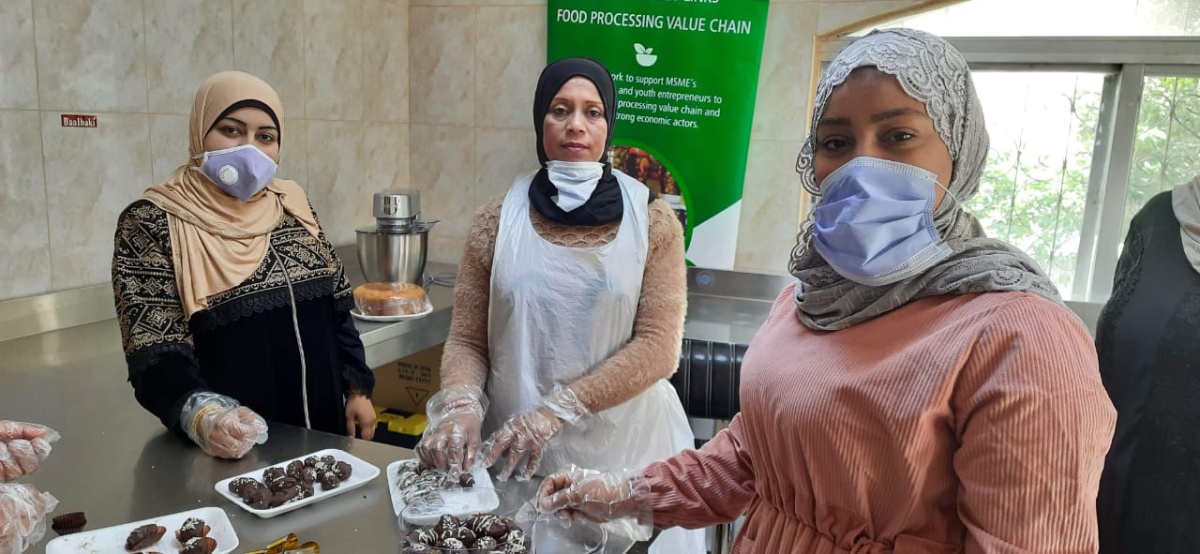By Eman Abu Qaoud
Driven by determination and strong will, 25 women from the village of Al-Kareema, in Northern Aghwar, established “Bint Blady Food Factory”, which produces power bars made of dates stuffed with nuts and covered in chocolate. The factory started production a few months ago; the project would not have worked out without the support of the women’s families and their determination to not succumb to the culture of shame, associated with working women.
The brainchild of Asmaa’ Al-Balawneh, the project was intended as a training center for the women of the area, with a focus on food production; out of it, Bint Blady was created.
The idea came to her after she and a group of women received the support of the “Environmental Lab” for testing food, medication, and make-up products as part of the Jordan Valley Links project funded by the Canadian MEDA. The women received training and support in equipping the factory through the project and signed an agreement with a firm to wrap and promote their product.
Asmaa, a special education bachelor’s degree holder from the University of Ajloun, says that “even after I obtained my special education diploma in 2003, got married and had three children, I still wanted to pursue my education. I learned patience and proper decision-making from people with disabilities. I decided to establish the center with the support of my husband, who was a day laborer. He joined a money-saving group to secure my project’s capital.
“I feel proud when a woman establishes her own home food production project.”
Over the last three years, 20 women managed to set up home projects and generate additional income for their families, to cover their children’s education expenses.
In Bint Blady’s case, explains Asmaa’, dates were selected for the project due to their high nutritional value and availability in the area. They thus are tasty, nutritional supplements for children. But the energy bars are not the only date-based product. Keen to revive the nutritional dishes their grandmothers used to make for them, the women also prepare “Al-Makhtoum”, a dish of dates cooked with olive oil and mixed with nuts.
Nour Al-Hanahneh, a mother of three and a home economics diploma holder, believes, like Asmaa, that women should work to achieve independence and be able to support their families financially.
Ahlam Al-Showbaki had the support of her husband who only uttered two words by way of encouragement: “You can”. These two simple words pushed her to keep working while stressing: “Yes, I can.”
Fedaa’ Al-Sobehi believes in the need to “think outside the box”, not wait for employment opportunities, and have women contribute to society and not depend on others.
Safaa’ Al-Balasmeh, who has a bachelor’s degree in management from Muta University, worked for only one year since she graduated nine years ago. She decided to join her fellows and utilize her education: “Each woman has a unique set of skills, and we complement each other.”
Not unlike others, Aalia Al-Saqr’s home project was affected by the COVID-19 pandemic. She used to prepare pastries for a school cafeteria, to be sold to students. With education taking place online during the pandemic, she had to find another job, so she joined the factory and says it helped crystalize her personality and sharpen her communication skills.
With hard work and determination, Asmaa and her coworkers managed to overcome challenges and realize their dream, becoming success stories and role models for the women in their society.
Al Nahda Women Network functions under the umbrella of the Arab Renaissance for Democracy and Development (ARDD) and strives to highlight women’s success stories in different areas and shed light on the challenges they face through a series of articles published on social media. This story is part of a series of blogs under ‘For Us-by-Us Project’ implemented in cooperation with Heinrich-Böll Stiftung Palestine/Jordan Office


